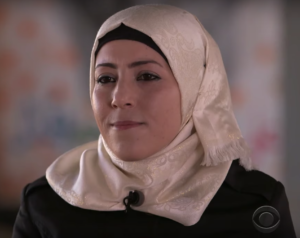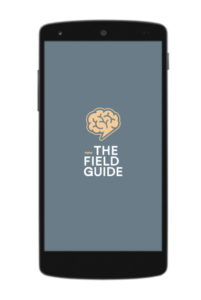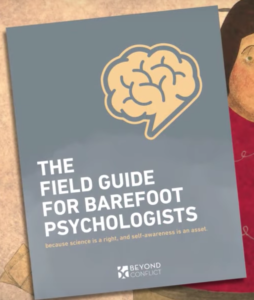Fighting Stigma and Providing Mental Health Care to Syrian Refugees
Ana Eira, Comms LeadYasmeen is a 28-year-old Syrian woman with a shy smile, a mother of three boys and a little girl, living in one of the world’s largest refugee camps. In the past seven years living in Za’atri, an urban settlement of tents and shipping containers outside Jordan’s capital, Yasmeen has looked for ways to cope with frequent nightmares and intrusive reminders of the war in Syria. She is one of over 10 million Syrians forcibly displaced by war, many of whom experience post-traumatic stress symptoms just like she does.
 Displaced populations like Yasmeen’s face a higher risk of experiencing mental illness while also dealing with a strong stigma associated with discussing their symptoms and seeking care. Though the physical, social, and economic toll of mental illness is severe, international assistance dedicated to mental health accounts for just 0.3% of all health aid. This has left many refugees with scarce resources to address the crippling emotional and psychological burden of forced displacement, trauma, and violence.
Displaced populations like Yasmeen’s face a higher risk of experiencing mental illness while also dealing with a strong stigma associated with discussing their symptoms and seeking care. Though the physical, social, and economic toll of mental illness is severe, international assistance dedicated to mental health accounts for just 0.3% of all health aid. This has left many refugees with scarce resources to address the crippling emotional and psychological burden of forced displacement, trauma, and violence.

Yasmeen was the last person to join a new psychosocial support program in Za’atri, The Field Guide for Barefoot Psychology. The Field Guide results from a collaboration between a local network of Syrian refugees and experts in neuroscience, clinical psychology, and community development. The Guide tells the story of two displaced Syrian siblings, Isra’ and Ahmad, paired with visual explanations of how their brain and body react to the trauma and stress they experience at every stage of their journey. The book, which will soon be available as a mobile application, also incorporates self-care and stress management exercises.
As one of the participants in the Field Guide, Yasmeen went through 18 group sessions over the course of 10 weeks. Community facilitators, trained refugee women just like her, led the sessions. As Yasmeen read about the journey of Isra’ and Ahmad, she learned tactics to control her nightmares and intrusive thoughts, but more importantly, that how she felt was not uncommon; it was prevalent in her community even though not shared. In addition to the lack of mental health resources, stigma remains a major barrier to mental health care in the Middle East and North Africa region.
Yasmeen talks about herself as “Yasmeen before” and “Yasmeen after” the Field Guide. Before, she describes her days filled with a feeling of suffocating nervousness and chest pressure impossible to shake off. After joining the group sessions, she says those feelings became less intense as she learned different breathing techniques and understood the science behind these signs her body was sending her.
 More than 250 people have participated in Field Guide activities in Jordan, Syria, and Lebanon. The Field Guide’s impact study was completed in 2019, and initial results suggest that its structured use plays a positive role in encouraging the use of mental health services, normalizing trauma symptoms, increasing resilience, and improving psychological symptoms of trauma.
More than 250 people have participated in Field Guide activities in Jordan, Syria, and Lebanon. The Field Guide’s impact study was completed in 2019, and initial results suggest that its structured use plays a positive role in encouraging the use of mental health services, normalizing trauma symptoms, increasing resilience, and improving psychological symptoms of trauma.
Mike Niconchuk, Beyond Conflict’s project lead, is optimistic about the future of the program:
Yasmeen credits the Guide with a “transformation” in her life. Over the last six months, she has become a pillar of support for women in her neighborhood, guiding them through breathing exercises and encouraging them to get in touch with their bodies and talk about their emotions. She is determined to share what she learned with as many women as possible.
 Displaced populations like Yasmeen’s face a higher risk of experiencing mental illness while also dealing with a strong stigma associated with discussing their symptoms and seeking care. Though the physical, social, and economic toll of mental illness is severe, international assistance dedicated to mental health accounts for just 0.3% of all health aid. This has left many refugees with scarce resources to address the crippling emotional and psychological burden of forced displacement, trauma, and violence.
Displaced populations like Yasmeen’s face a higher risk of experiencing mental illness while also dealing with a strong stigma associated with discussing their symptoms and seeking care. Though the physical, social, and economic toll of mental illness is severe, international assistance dedicated to mental health accounts for just 0.3% of all health aid. This has left many refugees with scarce resources to address the crippling emotional and psychological burden of forced displacement, trauma, and violence. 
Yasmeen was the last person to join a new psychosocial support program in Za’atri, The Field Guide for Barefoot Psychology. The Field Guide results from a collaboration between a local network of Syrian refugees and experts in neuroscience, clinical psychology, and community development. The Guide tells the story of two displaced Syrian siblings, Isra’ and Ahmad, paired with visual explanations of how their brain and body react to the trauma and stress they experience at every stage of their journey. The book, which will soon be available as a mobile application, also incorporates self-care and stress management exercises.
As one of the participants in the Field Guide, Yasmeen went through 18 group sessions over the course of 10 weeks. Community facilitators, trained refugee women just like her, led the sessions. As Yasmeen read about the journey of Isra’ and Ahmad, she learned tactics to control her nightmares and intrusive thoughts, but more importantly, that how she felt was not uncommon; it was prevalent in her community even though not shared. In addition to the lack of mental health resources, stigma remains a major barrier to mental health care in the Middle East and North Africa region.
Yasmeen talks about herself as “Yasmeen before” and “Yasmeen after” the Field Guide. Before, she describes her days filled with a feeling of suffocating nervousness and chest pressure impossible to shake off. After joining the group sessions, she says those feelings became less intense as she learned different breathing techniques and understood the science behind these signs her body was sending her.
 More than 250 people have participated in Field Guide activities in Jordan, Syria, and Lebanon. The Field Guide’s impact study was completed in 2019, and initial results suggest that its structured use plays a positive role in encouraging the use of mental health services, normalizing trauma symptoms, increasing resilience, and improving psychological symptoms of trauma.
More than 250 people have participated in Field Guide activities in Jordan, Syria, and Lebanon. The Field Guide’s impact study was completed in 2019, and initial results suggest that its structured use plays a positive role in encouraging the use of mental health services, normalizing trauma symptoms, increasing resilience, and improving psychological symptoms of trauma. Mike Niconchuk, Beyond Conflict’s project lead, is optimistic about the future of the program:
“The Field Guide is a non-clinical, community-based model for psychosocial support that has the potential to fill a large existing gap in global programing with displaced communities in training those working with displaced individuals.”Niconchuk believes in the program’s potential for scalability as it is cost-efficient and does not require the sustained presence of trained mental health or clinical professionals. With additional support, Niconchuk hopes to apply the Guide to emerging psychosocial crises around the world, including Venezuela/Colombia, Central America, and communities in the United States.
Yasmeen credits the Guide with a “transformation” in her life. Over the last six months, she has become a pillar of support for women in her neighborhood, guiding them through breathing exercises and encouraging them to get in touch with their bodies and talk about their emotions. She is determined to share what she learned with as many women as possible.
If you would like to support the project, donate here and subscribe to continue receiving updates.